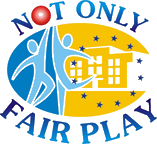
- Home
- Best
Practices - Toolkits
How to ... - Sport
Events - Guidelines
- Information
& Contacts - Project Management
A collection of student stories and initiatives about sport.
This section offers access to a collection of toolkits to promote sport at school.
-
 Physical Education Teachers
They are the main point of reference for students at school
Physical Education Teachers
They are the main point of reference for students at school
-
 Teachers
Teachers of all subjects can contribute to promote sport at school
Teachers
Teachers of all subjects can contribute to promote sport at school
-
 School Directors
Their support is a key element to promote sport at school
School Directors
Their support is a key element to promote sport at school
-
 Resources
A database of resources for teachers, PE teachers and school directors for the promotion of sport at school.
Resources
A database of resources for teachers, PE teachers and school directors for the promotion of sport at school.
Sporting events are organised in each partner country
Guidelines for policy makers willing to raise awareness on the importance of promoting sport in schools
Events
The Not Only Fair Play project has been promoted through conferences and articles.
Partnership
-
 Contractual Partners
From this section it is possible to access a description of each contractual partner of the Not Only Fair Play project.
Contractual Partners
From this section it is possible to access a description of each contractual partner of the Not Only Fair Play project.
-
 Schools
From this section it is possible to access information about the schools involved in the Not Only Fair Play Project in the 9 European countries involved.
Schools
From this section it is possible to access information about the schools involved in the Not Only Fair Play Project in the 9 European countries involved.
-
 Associated Partners
A number of associated partners officially joined the project in order to ensure the project sustainability by continuing to use the project deliverables over the next years.
Associated Partners
A number of associated partners officially joined the project in order to ensure the project sustainability by continuing to use the project deliverables over the next years.
This section of the Not Only Fair Play portal provides administrative information for the project contractual partners and for the European Commission, and is password protected.
Physical Education Teachers
Homepage > Toolkits > Physical Education Teachers

They are the main point of reference for students at school
Back to the Physical Education Teachers Toolkits
Promotion of an ethical approach to sport, including communication strategies with parents
A Toolkit for Physical Education Teacher
• Cooperation with teachers of other subjects aiming at promotion of morality and ethical code of conduct highlights the role that sport ethics should play in our society. It also introduce the concept of the sport values and ethical code of behaviour.
• Using the ICT tools for promotion of an ethical code of conduct presents the main challenges that teachers and parents deal with when using ICT with their students and children and also help them deal with these challenges.
• Communication with parents. Children’s sports participation may be influenced by numerous factors but parents seem to be the most important. Establishing close communication with parents will help PE teachers.
• Human rights in sport focuses on the importance of the relationship between human rights and sport in our modern world. Sport itself, both international and national, can play an extraordinarily significant role in advancing human rights, particularly among some of the world’s most disadvantaged and vulnerable people.
• Threats and challenges to an ethical approach in sport demonstrates a rage of factors threatening a clear sport competition that may have destructive impact on sports carriers and provides a reflection on the future vision of sport.
• Ethical approaches in inclusive sport allows teachers to explore in depth the issue of ethical approach to sports, focusing on the area of inclusive education.
• Ethical behaviour of sports fans and spectators during sporting events provides teachers with analysis of the phenomena of inappropriate behavior of sports fans and gives inspiration for discussion of ethical dimension of supporting athletes and sports teams.
• Ethics in coaching highlights the important role of PE teachers and coaches as role models for young people and provides educators with tips on building positive relationships with other groups involved in sports.
• PE teachers’ professional development in terms of ethical competence focuses on abilities of PE teachers to deal with complex, ambiguous situations involving ethical dilemmas. The topic also includes the issue of shaping students’ ethical competence through “educating for character”.


